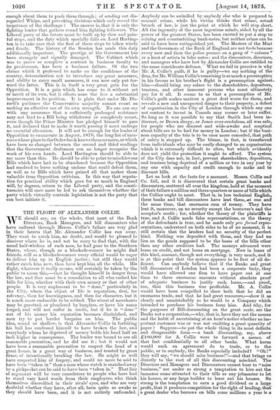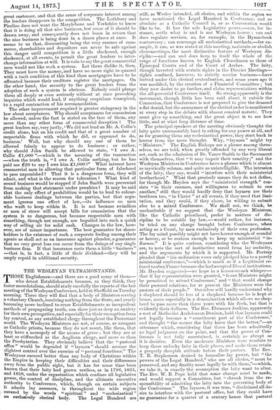THE FLIGHT OF ALEXANDER COLLIE.
WE should say, on the whole, that most of the Bank Directors, Bank Managers, and bill discounters who have suffered through Messrs. Collie's failure are very glad in their hearts that Mr. Alexander Collie has run away. They want to catch him, no doubt, and would be pleased to discover where he is, and not be sorry to find that, with the usual half-wisdom of such men, he had gone to the Southern States, where, though as a blockade-runner he might find friends, still as a blockade-runner every official would be eager to deliver him up to English justice ; but still they would rather catch him now, than have kept him all the while. His flight, whatever it really means, will certainly be taken by the public to mean this,—that he thought himself in danger from the law, and that must be a consolation to all who cashed his bills for him, whether with their own money or that of other people. It is very unpleasant to be "done," particularly in the City, where the object of life is reputation, first, for solvency, then for knowingness, and then for character, but it is much more endurable to be robbed. The wisest of merchants may be garotted, or plundered by burglars, or have his name forged, and will not suffer in credit, but if he is " done " out of his money his reputation becomes diminished, and men try to put harder bargains on him. The public idea, sound or shallow, is that Alexander Collie in forfeiting his bail has confessed himself to have broken the law, and everybody whom he deprived of money holds his head half an inch higher in consequence. The lender was bound to use all reasonable precaution, and he did use it ; but it would not have been a reasonable precaution to suspect the head of a great house, in a great way of business, and trusted by great firms, of intentionally breaking the law. He might as well have suspected him of forgery, and could no more be said to have been "taken in" than a man whose watch is snatched away by a pickpocket can be said to have been "taken in." That line of argument will be very consolatory to people who have had to stand very hard words from their employers, who think themselves discredited in their rivals' eyes, and who are very doubtful whether they have, after all, been quite as awake as they should have been, and it is not entirely unfounded.
I Anybody can be swindled by anybody else who is prepared to commit crime, while his victim thinks that crime, actual breach of law, is just the point at which he will stop short.. All the ingenuity of the most ingenious minds, aided by all the- power of the greatest States, has been exerted to put a stop to coining and counterfeiting bank-notes, but neither crime can be said to have been extinguished yet. The Masters of the Mint and the Governors of the Bank of England are not fools because. every now and then the police pounce on a gang of " coiner§ " or a knot of artists in false notes; and the discounters, directors, and managers who have lost by Alexander Collie are entitled to the same considerate defence. What we fail to perceive is why Mr. A. Collie's guilt, if he is guilty—we say nothing of the firm, for Mr. William Collie's remaining is as much a presumptior in his favour as his brother's flight is a presumption againsi- him—should bring any solace to the shareholders, depositors, trustees, and other innocent persons who must ultimately pay for it all. It seems to us that a presumption of Mr.. Collie's guilt makes matters a great deal worse for them, and reveals a new and unexpected danger to their property, a defect of organisation in the City of London through which any one not content to invest in Consols may sooner or later suffer.. So long as it was possible to say that Smith had been in- discreet, or Brown sleepy, or Jones over-credulous, all was safe,. for people who are discreet and wide-awake and sceptical about bills are to be had for money in London; but if the busi- ness capacity of the trio is to be once more conceded, that path of safety is stopped up. The blame, in fact, is transferred from individuals who may be easily changed to an organisation. which it is extremely difficult to alter, but which evidently does not yield the protection it ought to afford. The system, of the City does not, in fact, prevent shareholders, depositorrs, and trustees being deprived of a million or two in any ycar by any one with capacity and credit enough to make And te discount bills.
Let us look at the facts for a moment. Messrs. Collie an Co. fail, and it is discovered that certain great banks and discounters, scattered all over the kingdom, hold at the moment of their failure a million and three-quarters or more of bills which the Collies ought to meet. That is, in less technical English, these banks and bill discounters have lent them, at one and the same time, that enormous sum of money. They have lent it, moreover, on no security except the borrower's and the acceptor's credit ; for, whether the theory of the plaintiffs is true, and A. Collie made false representations, or the theory- of the defendants is true, and he made only pro forma repre- sentations, understood on both sides to be a no moment, it is still certain that the lenders had no security of the perfect kind. Nothing was deposited with them, and they had no- lien on the goods supposed to be the bases of the bills other than any other creditors had. The moneys advanced were loans on credit, and not loans on mortgage. Now in loans of this kind, amount, though not everything, is very much, and it is at this point that the system appears to be first of all de- ficient. Can anybody believe that if the Banks and great bill discounters of London had been a corporate body, they would have allowed one firm to have paper out at one time to these enormous amounts without absolute proof of adequate business to justify such loans,—and proof,.
too, that this business was profitable. Mr. A. Collie would have been compelled to show both that he did an enormous trade, and that he had great resources,—show it as, clearly and unmistakably as he would to a Company which intended to purchase his business from him. And why, for the purposes of Bill-discounting on the great scale, are the- Banks not a corporation,—why, that is, have they not the means and the habit of ascertaining at an hour's notice whether an im- portant customer was or was not emitting a great quantity of paper ? Suppose—to put the whole thing in its most definite and disagreeable form — a bank discounting, say, above- L100,000 for A. Collie were to forward a memo, of that fact confidentially to all other banks. What harm would such an agreement do to trade, or to the public, or to anybody, the Banks especially included? "Oh!" they will say, "we should miss business!"—and that brings us. directly to the root of all this discounting mischief. The
and Managers and Discounters cannot bear to "miss business," are under as strong a temptation to hire out the immense sums attracted to their tills as any jobmaster to let his horses, or any large builder to lease out his houses. So. strong is the temptation to earn a goad dividend or a large profit, that it produces competition for the right of lending, that' a great dealer who borrows on bills some millions a year is a great customer, and that the sense of corporate interest among the lenders disappears in the competition. The Lothbury and Pimlico does not want the Marylebone and Yorkshire to know that it is doing all that nice business, lest some of it should be drawn away, and consequently does not learn in return that the nice business is being done in a dozen places at once. It seems to us that, discounting being the very essence of com- merce, shareholders and depositors can never be safe against this danger until competition is a little slackened, enough slackened, at all events, to permit the great lenders to inter- change information at will. It is vain to say the great commercial men would not like such a system. Let them dislike it, then. They must have the money, and have no more right to quarrel with a tacit condition of this kind than mortgagors have to be affronted because their creditors register the mortgages. On the other hand, the security to the great lenders from the adoption of such a system is obvious. Nobody could plunge them all deeply or even seriously without at once provoking inquiries which would lead, if anything suspicious transpired, to a rapid contraction of his accommodation.
The other improvement required is greater stringency in the law about acceptances. Why should acceptances for commission be allowed, unless the fact is stated on the face of them, any more than any other form of commercial deception ? The great lenders say, very justly, 'We did not lend on Mr. A. Collie's credit alone, but on his credit and that of a great number of respectable firms with which he did, or appeared to do, business.' Well, but why should any one of them be allowed falsely to appear to do business ; or rather, why should John Smith be allowed to state, "I owe A. Collie £1,000 "—which is the meaning of the transaction —when the truth is, "I owe A. Collie nothing, but he has paid me £20 to say I owe him £1,000?" What interest have commercial men in allowing that particular form of falsehood to pass unpunished? That it is a dangerous form, they will admit, and what is the reason for toleration ? What kind of sound business would be stopped if John Smith were prevented from making that statement under penalties ? It may be said that the only effect of prohibition would be to lead to colour- able business dealings between the parties, but that argu- ment ignores one effect of law,—its influence on men who wan% to keep within it. It is not because swindlers or men of straw will accept bills for commission that the system . is so dangerous, but because respectable men with something, though not enough, are beguiled into such a quick way of selling air for solid cash. Changes in the law, how- ever, are of minor importance. The best guarantee for share- holders is the existence of such a corporate feeling among their• agents as shall act as au insurance against plunder, a guarantee that no very great loss can occur from the doings of any single business firm. If that insurance costs them a little "business" —that is, in fact, a little of their dividend—they will be amply repaid in additional security.































 Previous page
Previous page